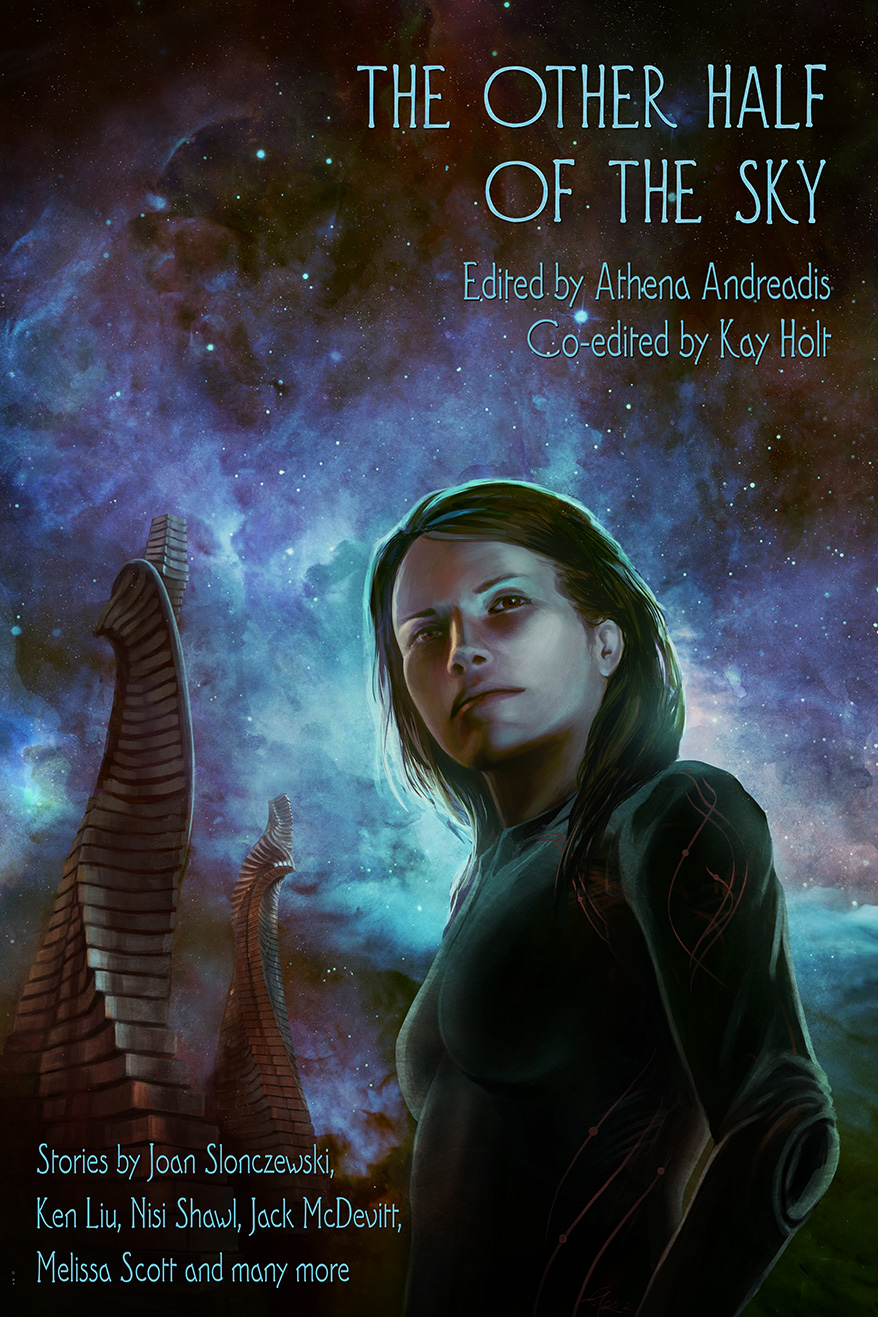
Ever since SF/F came into existence as a (self-)conscious genre, it has prided itself on its imagination: far-out concepts, what-if premises, new worlds and cultures. But our experience is still, well, local. We all share the same planet, with its limiting intrinsics and dizzyingly rich but finite configurations, even among non-human species. And all humans share the same baseline brain configuration which does constrain certain aspects of our behavior. For example, we’re not true solitaries, even the attic- or cave-dwelling misanthropes and anchorites among us. So the genre’s new human(oid) worlds are inevitably mixes of ones that already exist – seamless fusions at best, staple-strewn frankenmonsters at worst. As media like the Internet give people a veneer of global knowledge, SF/F writers, willy-nilly, include in their works pieces of disciplines and cultures that are not their own, unless they are content to remain within the suffocating “write what you know” straitjacket. This, to put it mildly, has created a Gordian knot.
Language is a great bridge but an equally great barrier. At this point, SF/F is still heavily Anglophone and most of its practitioners are either Anglosaxons or live in an Anglosaxon country. As I discussed in several previous forays (relevant links are at the end of this article), this has resulted in the parochialism of unquestioned dominant-group assumptions: stories written by armchair tourists (Bacigalupi, MacDonald, Roberts) get accolades and awards while those by outsiders (whether “natives” or “immigrants”) are discounted as too alien. Many works that attempt to portray other cultures carry an unmistakable whiff of the colonial outlook with its propensity to casually exoticize/dehumanize/homogenize non-default Others: Chinese swords aren’t called katanas and Krishna’s primary weapon is a serrated disc, not a pointed missile.
At the same time, the discussions about what constitutes verisimilitude or authenticity in an SF/F work have been long and heated. One outcome, also parochial but along a different axis, is that purists of specific stripes exhaustively critique the domains that interest them while blithely ignoring the rest of the discrepancies: food descriptions must be correct but who cares about accurate depictions (or even the basics) of planetary orbits or reproduction!
Personally, I’m “between” in too many ways to avoid or count – between cultures, between languages, between gender roles, between mindsets as a practicing scientist who’s also a feminist; these attributes have made me a feral non-joiner who has no clearly defined “tribe” (a term used with great frequency and approval in SF/F workshops and conventions)… and, believe it or not, a “between” in questions of authenticity because of the ever-shifting vision that results from such an existence. Of course, I have flung plenty of books summarily into recycling bins when they cavalierly mangle contexts I know well. As is my custom, I’ll put my conclusion up first: writers walk a tightrope even when they write about their own culture. They must be explorers and scholars at the same time, use both telescopes and microscopes, build photon sails while consulting dictionaries.
If someone writes historical fiction, authenticity is easier to judge. To give but one example, stories in which wives in medieval western Europe run around with their hair floating in the breeze are simply ridiculous. On the other hand, stories of future- or alternate-X (X=India, Brazil, Hellas, Turkey, Russia, China, Thailand… plus hybrids thereof) are rooms in fiction’s mansion that bristle with potential for both achievement and disaster.
What makes a treatment “respectful” (a far better criterion would be simply beyond-surface knowledge plus quality of inspiration and execution, but we’ll let that go for now) is a combination of factors that are hard to optimize simultaneously: the author’s imagination and ability are certainly involved, but so is their willingness to absorb and apply new, often discomfiting knowledge; the distance of the new world from its original and the degree of hybridization also play significant roles. Most invented/extrapolated languages and cultures are as solid (and as attractive) as wet cement. Nevertheless, I’ve seen many that are interesting, even though all but the very best lack the complexity, arbitrariness and depth that comes from being ground and sifted over time by different peoples. And so it comes to pass that Alexander Jablokov’s Russian/Byzantine-tinged future Earth works for me and so does – with some reservations – Sherwood Smith’s Colend culture (a fusion of Renaissance Florence with Heian Kyoto), whereas nearly all steampunk alt-Europes and cyberpunk alt-Earths look like Diogenes’ plucked rooster to me.

A quick-n-easy way to fake authenticity is to drop crumbs of the relevant language/jargon. I think it’s fine to use culture-specific concepts that are hard to translate eloquently or briefly – from mono no aware to palikári (plural palikária, not palikáris, dammit!). However, subjecting readers to an eye-poking parade of tourist guide words (yes, no, and their ilk – hello, Winds of Khalakovo!) indicates near-lethal laziness on a writer’s part. In that respect travelogues are far worse, leaving aside their usual breathlessness.
While I’m on the subject, there’s no intrinsic taint to apostrophes and accents, contrary to HackWriting 101 injunctions. My own language uses/ed both for concrete functions: apostrophes were soft consonants (dhaseía represented the H in Helen, just as the French circumflex represents a silenced S: hôpital, forêt), while accents show where stress falls within a word. Default stress differs across languages (French always stresses the last syllable, English defaults to the penultimate), so I often find it necessary to use accents when I want to convey this information. It’s Athiná, not Athína, and that “th” represents a theta, not a tau, phoneme.
At the same time, the engineers are right when they say that the perfect is the enemy of the good. True, I still have to fight my instinctive reactions when I see foreigners use my culture and language in their fiction, although I will read – even like – a work if the writer has absorbed enough for the story’s purpose. However, if I were to demand that a writer should never use any Hellenic words or myths whatsoever in their alt-Alexander fantasy unless they also reproduce all the historic/cultural background that made the words and events in their story possible I’d essentially be arguing that only minutely researched historical fiction is legitimate – and, more distally, that no context-specific fiction is really legitimate at all. This does not even take into account the precipitous linguistic poverty such a stricture would impose: the endpoint of this logic is that only grunts would be acceptable and legitimate in extrapolated or imagined settings.
Although a “native” reader can instantly tell if a setting borrowed/adapted from her culture, discipline, etc is generic and can legitimately criticize the work if that’s the case, standards of absolute purity are impossible to uphold even in real life (as demonstrated by the internal language wars across cultures and eras; the demotic versus puristic and polytonic versus monotonic fires in my corner of the world have been smoldering for at least four centuries). A purity policy would erase most of the SF/F landscape, including Paul Preuss’ beautifully crafted Secret Passages and Jacqueline Carey’s Kushiel books that present a fascinating alternative Renaissance earth (the first trilogy, at least – I haven’t read the rest; I lost interest when Phèdre nó Delaunay became monogamous with a crashing bore and both she and Melisande Shahrizai were sidelined in favor of their shared son). Which brings me to the “native” writer’s plight.
This may come as a surprise, but all nations/cultures are heterogeneous and when people write they do so as individuals, not representatives-at-large of their “kind”. So even when “natives” write about their own culture, whether history or fantasy, they transmute it through their personal experiences and filters. How I deal with customs, relationships, historical events in my fiction will not be necessarily palatable to fellow Hellenes, just as Nnedi Okorafor’s Who Fears Death raised hackles among Nigerians. Some have read my stories Dry Rivers and Planetfall, which are part of a larger universe. My Minoans, Kushites, Sarmatians and Celts are as non-canonical as Carey’s, though in a different direction. More importantly, so are my contemporary Cretans. If I succeed in what I set out to do, non-native readers won’t be able to discern the seams between history and invention – and for those who do see them (and Hellenes definitely will, trust me) my hope is that they will like the story enough on other grounds that they’re willing to go with it.
The balance between authenticity and imagination is an intrinsic dilemma for writers. All who write walk that rope, but in contemporary SF/F it’s strung across a potentially killing gorge. If we walk that rope, we must do so fully prepared, in full knowledge of the abyss below us, and fully aware that we’ll invariably fall. That’s the risk explorers take.

Images: 1st, Scott Rolfe, Boxes of Shipwreck; 2nd, Lee Lorenz, The New Yorker; 3rd, unknown artist, SF version of Plato’s cave.
Related articles:
Being Part of Everyone’s Furniture; Or: Appropriate Away!
Jade Masks, Lead Balloons and Tin Ears
Safe Exoticism, Part 2: Culture
Close Your Eyes and Think of Apóllon
As Weak as Women’s Magic








